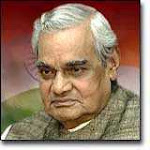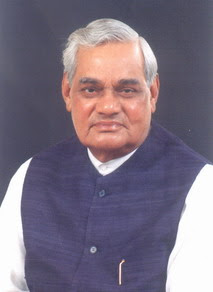Speech 1:
Feb 26, 1970, Lok Sabha
-------------------------------------------------------------------------------------------------
-------------------------------------------------------------------------------------------------
Speech 3:
March 31, 1971
On Bangladesh Liberation
Vajpayee: "We congratulate Sheikh Mujibur Rehman. Nationalism cannot be based on religion. This is East Bengal's very first lesson"
Indira: "You should learn it"
Vajpayee: "We never believed in 2 nation theory. It is completely wrong. When the country was partitioned our party did not even exist. Partition took place even before our birth, and I do not want to point my finger at those responsible for it."
-------------------------------------------------------------------------------------------------
Speech 4:
Feb 27, 1974
Event: Junior doctors strike in Delhi demanding Rs.500 salary, a city allowance and a non-practising allowance. The government was hell bent on breaking the strike.
Indira: "The very poorest were not complaining or non-coperating or having strikes, but the people who were comparatively better off. I cannot understand this and am surprised"
Vajpayee: "Is there a special effort needed to understand this? The very poor are mute, disorganized, suppressed for centuries, they cannot fight. They freeze to death on the footpath, they cannot loot cloth shops. They may die of starvation, but they won't raid godowns. On the other hand, those who are better off are aware and organized. They would adopt new ways of change. Those who are poor are resigned to their fate,but those who are somewhat enlightened are struggling to change their fate. This is why students, teachers, doctors, engineers are struggling today. Instead of resorting to oppression the government should try and understand their mind. People can be killed with bullets but their hearts cannot be won with bullets."
-------------------------------------------------------------------------------------------------
Speech 5:
May 14, 1970:
Biwandi, a place in Maharashtra had witnessed worst communal riots
Vajpayee said that National Integration Council was set up to solve communal problems, but not all national parties including Jan Sangh was a part of it. So Vajpayee was angry and blasted at the very concept of NIC and Indira Gandhi.
Vajpayee: "Who should be included in this council depends upon her (PM Indira). But is she prepared to say anything on Muslim communalists? It is known to all that in Bhawandi the Tamir-i-Millat had vitiated the atmosphere. But did anyone name it? The Shiv Sena is being criticized and it should be..We too are being dragged in. We are not here at the PM's pleasure, we are here in spite of her. We too represent the people of the country. But when there is a question of Muslim communalism, their lips are sealed. What is Jaimat-ul-Ulema doing? What is Jaimat -i-Islami doing? What did Tamir-e-Millat do in Bhawandi?The Maharashtra government demanded a magisterial inquiry and not judicial inquiry. Since partition, the nexus between communalists and communists are on the rise and they have PM's blessings. This is the reason why communalism is growing. if Jan Sangh is wrong, show it to us and we are ready to correct it."
Indira: Sir, I am not speaking just to score points. I have never interrupted any Hon.Member while he was speeaking, I have done now because I felt it deeply, and I also have courage of conviction. Shri Vajpayee has used this occasion mainly to attack Muslims and all minorities in general. He as proclaimed with his hand raised in the old Hitler style.
Another member Shri Kanwar Lal Gupta said to Indira that Indira had taken such a training
Indira: What training I took is the business of Indian people, not yours. I do not know the words Vajpayee used, but he has challenged me for something. I would like to tell him I have never shirked a challenge, and never will. We should face the indian people.
Vajpayee: PM should not lose her control
Indira: I am not losing my control, I am only saying with emphasis. I am not given to losing control over myself
Vajpayee: I am also ready to face any type of challenge
Indira: Please do not talk like that. I am used to Vajpayee ji and his party attacking me and even in public statements they demean me by levelling baseless charges. Mr Vajpayee asked me why these riots start. I do not know but speeches like what Vajpayee has made is enough to start one.
Some members said that his speech must be expunged. I do not want so. I want it remain on record so that future generations could see the real thinking of Jan Sangh- not the forceful Hindi that Shri Vajpayee uses from time to time, but the truth behind the words. We saw naked Fascism today. There would be no one in the country, let alone in the House, who would not have respect for Shivaji. Communalism is bad, whether of hindus or Muslims or Sikhs. It is not true that whenever such a thing has flared up, we have not condemned it. Whenever Muslim organization or individual used inflammatory words we have condemned it. At the same time I have already told that majority community have a special repsonsibility, whoever it be- Hindus, Muslims, Sikhs. Shri Vajpayee said in Ahmedabad that people should not take law in their own hands. But for me the rest of his speech looked as if he is emphasizing one point - we shall not do all this. What does this mean? It means 'we shall take law in our hands, we shall take action, we must take steps'
Vajpayee: I had not said so
Indira: This is what I understood the speec to mean. If this is not the meaning I hope he would clarify what it means and tell people not to do so. His own people are not doing so.
Vajpayee: But Congress can do it. Members of Congress party can do it.
Indira: Vajpayee just declared Muslims started the riots. He asked, why? And he himself gave the answer - because they feel that they cannot live in India. So they are launching this deadly battle.
Vajpayee: This is one reason
Indira: All right, it is one of the reasons
Vajpayee: I had said so...There is nothing wrong in it. It is being objected to..
Indira: No objection is being raised. I would like to read some of the speeches made by members of his party who have said that Muslims cannot live in India unless they are Indianized
Vajpayee: Now, it is my turn to challenge the PM. Let her produce a single speech, and I am prepared to take action against that Jan Sangh leader
Indira: Shri Gowalkar
Vajpayee: Show a single one
Indira: Why one, we will show the whole thing. They are presented in NIC.
Vajpayee: Talk about Jan Sangg, the Jan Sangh
Indira: Talk about whom?
Vajpayee: I am talking about you, not the Jamat Ulema. Othwerwise you will get into difficulties. You have seen what speeches Jamat Ulema made
Indira: We oppose all such speeches, whatever the community or organization the people they may belong to.
Shri R.S. Yadav: The house wants to know what you are going to do
Indira: We will take action required. Already an inquiry has begun. I welcome Vajpayee's speech because for the first time we feel he has come over ground. This is not something which can be solved with a speech..
Wow, what a wonderful conversation. Both leaders were correct and I can say none won or lost. Such debates do no longer take place and it is very sad. This was the height at which an issue was being discussed so openly and effectively.










